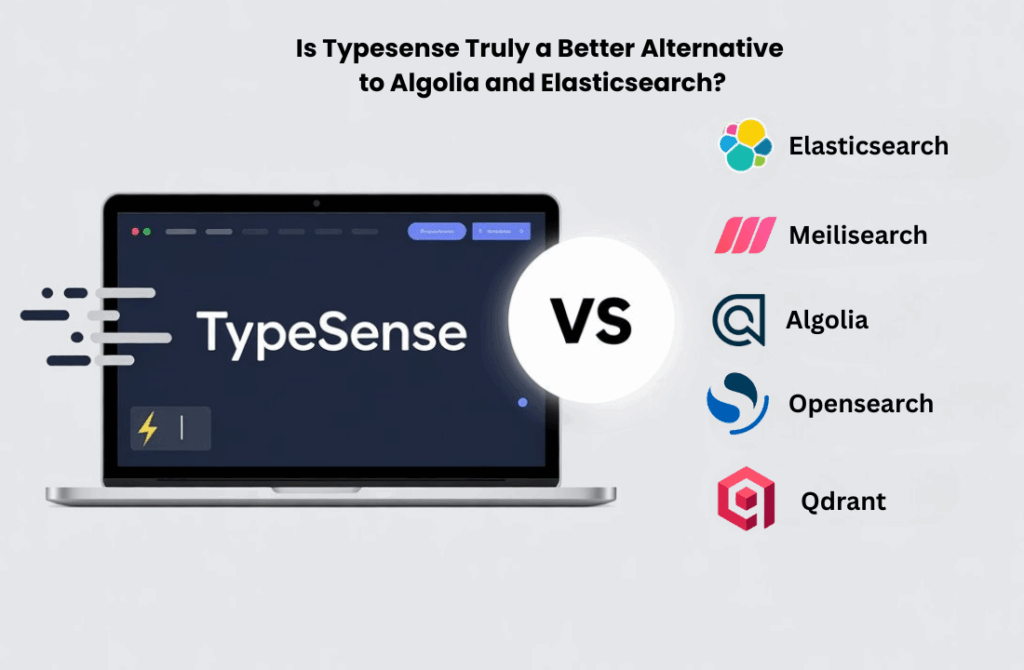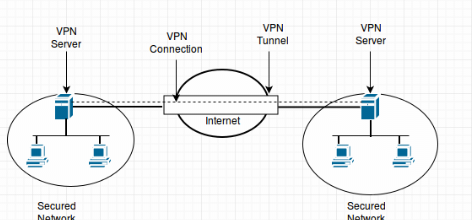Is Typesense Truly a Better Alternative to Algolia and Elasticsearch?
Popular search solutions like Algolia or Elasticsearch are widely adopted but often come with downsides like high pricing, complex configurations, or limited customization. That’s where Typesense stands out with its speed, simplicity, and developer-first approach. But how does it really compare to other search platforms on the market?
In this blog, we’ll explore Typesense in depth and see how it stacks up against top alternatives like Elasticsearch, Meilisearch, Algolia, and OpenSearch. We’ll break down their features, pricing, performance, ease of use, and hosting options to help you decide which search engine fits your project best, whether you’re building an eCommerce store, a documentation site, or a high-traffic web app.
- More than 40% of developers use Typesense for its ease of setup and use as the main reason for selecting it over Elasticsearch.
- Typesense delivers search results in approximately 50 milliseconds for datasets with over 1 million records.
- In contrast to Elasticsearch, Typesense is one binary with no external dependencies, making deployment and resource management much easier.
What is Typesense?
Typesense is an open-source, in-memory search engine that’s designed with a focus on speed, ease of use, and developer-friendliness. It helps developers build search experiences that feel fast and responsive without the steep learning curve that comes with more complex tools.
At its core, Typesense was created to solve a common problem: traditional search engines often require a deep understanding of complex configurations, scaling problems, and relevance tuning. Typesense flips that experience by offering sensible defaults, a simple API, and features that just work out of the box.
Whether you are creating a product catalog, a documentation site, or a blog search, Typesense provides:
- Lightning-fast search results and real-time indexing
- Typo-tolerance so users find what they need even with spelling errors
- Built-in faceting and filtering for a structured search experience
- Secure, self-hosted deployment or the flexibility to run it on managed servers
Its minimal configuration and modern approach make it a top choice for developers who want full control without the usual complexity.
And if you want to scale your setup further, you can pair it with Typesense VPS Hosting, which offers dedicated resources, high performance, and better control, especially for high-traffic applications.
What is Typesense VPS Hosting?
Typesense VPS Hosting refers to deploying the Typesense search engine on a Virtual Private Server (VPS), offering an ideal balance between control, speed, and scalability. It allows developers and businesses to run their own instance of Typesense with full administrative access.
On its own, it’s a great tool, but how it’s hosted can significantly affect performance, reliability, and scalability. By choosing VPS hosting for Typesense, you’re installing and operating it on a private, isolated server environment.
This setup gives you the flexibility to:
- Deploy and configure Typesense exactly how you want
- Run it with dedicated CPU and RAM resources
- Avoid performance bottlenecks common in shared environments
- Secure your instance with full root access and customizable firewalls
Whether you’re powering a search bar for an eCommerce site, a documentation portal, or a real-time filtering system, VPS hosting ensures that Typesense delivers consistently fast search results, even under load.
If you’re using Typesense VPS Hosting from a provider like AccuWeb Hosting, you also get:
- Expert setup
- Free SSL certificate for secure connections
- Regular OS and security updates
- Built-in protection from DDoS and brute-force attacks
- 24/7 technical support
In short, Typesense VPS Hosting combines the speed and simplicity of Typesense with the power and reliability of a virtual server.
Typesense Alternatives
1. Elasticsearch
A battle-tested, scalable engine designed for log analytics, observability, and enterprise-level full-text search at scale.
Built on Apache Lucene, Elasticsearch powers major platforms like Wikipedia, GitHub, and Stack Overflow, making it ideal for complex, distributed search systems with high availability requirements.
Pros:
- Self-hosted option available
- Supports vector search with active-passive replication
- Full backward compatibility
- Strong support for typo tolerance and geo search
Cons:
- No built-in semantic, image, or voice search
- Record schema validation is not supported
- No built-in search analytics
- Support is web-based only, with limited contact and a slow (3-day) response
- Backups and search limits are not clearly specified
Pricing:
$99/month
2. Meilisearch
A lightweight, developer-first search engine optimized for fast, typo-tolerant search with instant indexing.
Meilisearch is ideal for product search, content discovery, and web apps needing a fast, clean search experience without the operational overhead of larger engines.
Pros:
- Fully open source and easy to self-host
- Built from the ground up with a developer-friendly approach
- Supports vector search, semantic search, typo tolerance, and geo search
- No limitation on index size (only constrained by available disk)
- Index backward compatibility available
Cons:
- No support for JOINs across multiple indices
- Image and voice search are not supported
- Search analytics are available only through the cloud offering
- Backups are manual
- Primary indexing relies on disk (with memory-mapped files), which may impact performance for large-scale search
Pricing:
$30/month, includes 50k searches/month and 100k documents. Data retention is limited to 7-day search data and 30-day metrics. Support is community-only, and backups are manual.
Why Typesense VPS Hosting Wins:
For just $12/month, Typesense VPS Hosting offers twice the document limit (200k), lifetime data retention, weekly free backups, and 24/7 expert support. It also includes record schema validation, JOINs across indices, image search, and voice search, with a RAM-based index for faster performance.
3. Algolia
A proprietary platform built for lightning-fast search with personalization and e-commerce optimization at its core.
Algolia specializes in instant, relevance-driven search, making it a go-to for SaaS platforms, online stores, and content-heavy applications requiring tight UX performance.
Pros:
- AI-powered personalization and recommendations
- Excellent typo tolerance and instant search capabilities
- Robust integrations with popular platforms and frameworks
- Optimized for e-commerce and content discovery
Cons:
- Expensive pricing, especially as search volume or records scale
- Closed-source, limiting customization for self-hosted setups
- Limited flexibility for query-time configuration compared to Typesense
- Not ideal for budget-conscious teams or small-scale projects
Pricing:
Starts at $0.50 per 1,000 search requests and $0.40 per 1,000 records (pay-as-you-go). Enterprise plans are custom-priced and can become costly for high-traffic applications.
4. OpenSearch
An enterprise-focused fork of Elasticsearch, built to ensure open access to scalable search and analytics infrastructure. Backed by AWS and the open-source community, OpenSearch serves as a free, extensible alternative for teams migrating from Elasticsearch or seeking data sovereignty.
Pros:
- Scalable and robust for enterprise-scale search
- Supports full-text search, vector search, and analytics
- Active community and compatibility with Elasticsearch tools
- Open-source under Apache 2.0 license
Cons:
- Similar complexity to Elasticsearch, requiring JVM tuning
- Higher resource demands compared to lightweight alternatives like Typesense
- Limited out-of-the-box features for instant search experiences
- Less focus on a developer-friendly setup for smaller teams
Pricing:
The base starting price for Amazon OpenSearch Service is $0.024 per hour, translating to an estimated monthly cost of $17.52.
5. Qdrant
A modern, vector-native search engine purpose-built for AI-powered similarity and semantic search use cases.
Optimized for machine learning pipelines, Qdrant excels in high-dimensional vector retrieval, making it a strong choice for recommendation engines, image search, and NLP-based applications.
Pros:
- Excellent for vector and semantic search
- Scalable for billions of high-dimensional
- vectors Rust-based for high performance and reliability
- Supports advanced AI-driven search use cases
- Open-source with a growing community
Cons:
- Primarily focused on vector search, less optimized for full-text search
- Limited support for traditional search features like faceting
- Smaller ecosystem and fewer integrations compared to Typesense
- Steeper learning curve for non-AI use cases
- Less suitable for general-purpose search applications
Pricing:
Qdrant offers pay-per-hour pricing.
Typesense VPS Hosting delivers blazing-fast, typo-tolerant search with easy setup and full data control. Unlike costly or complex alternatives, it offers predictable pricing, dedicated resources, and enhanced security, perfect for developers seeking powerful search performance without heavy maintenance or hidden fees.
Conclusion
While each search platform offers unique strengths, Typesense VPS Hosting uniquely balances performance, ease of use, and full control over your search infrastructure. Its combination of in-memory speed, typo tolerance, and customizable hosting empowers developers to build fast, reliable search experiences without the overhead and complexity often associated with other solutions. For teams seeking a cost-effective, scalable, and secure search option, Typesense VPS is a practical choice that adapts to diverse project needs, helping you focus on what matters most: delivering great user experiences.
FAQs
1. What is Typesense used for?
Typesense is an open-source, in-memory search engine used to build fast, typo-tolerant, and developer-friendly search experiences for websites and applications.
2. Why should I host Typesense on a VPS?
Hosting Typesense on a VPS gives you dedicated resources, complete control over configuration, better performance, and improved reliability for high-traffic apps.
3. How does Typesense handle typos in search queries?
Typesense includes built-in typo tolerance, allowing users to get accurate results even when their search terms include spelling mistakes.
4. What types of projects is Typesense suitable for?
Typesense is ideal for eCommerce stores, documentation portals, blogs, product catalogs, and any app that needs fast, structured search functionality.
About the Author: Jason-Pat
Founder & CTO at AccuWebHosting.com. He shares his web hosting insights at AccuWebHosting blog. He mostly writes on the latest web hosting trends, WordPress, storage technologies, Windows and Linux hosting platforms.



